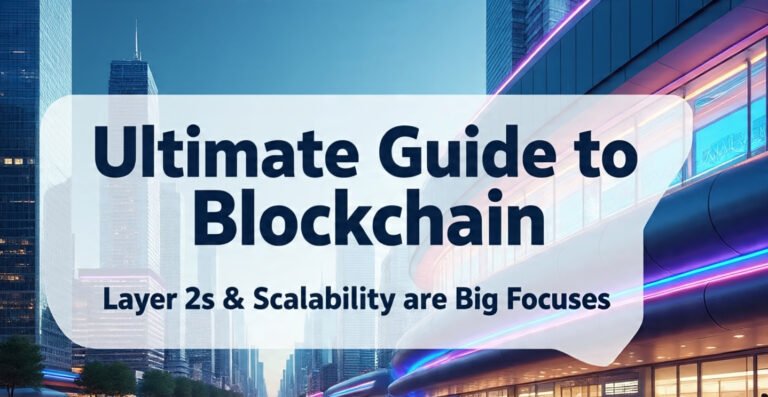The cryptocurrency landscape is experiencing unprecedented growth, but with this expansion comes significant challenges. Layer 2s & Scalability are Big Focuses that have captured the attention of developers, investors, and blockchain enthusiasts worldwide. As blockchain networks struggle with congestion, high transaction fees, and slow processing times, innovative scaling solutions have emerged as the cornerstone of crypto’s evolutionary journey.
Layer 2 solutions and blockchain scalability have become such critical priorities is essential for anyone navigating the modern digital asset ecosystem. These technologies promise to unlock blockchain’s true potential while maintaining the security and decentralization that make cryptocurrencies revolutionary.
Why Layer 2s & Scalability are Big Foci in Today’s Blockchain Ecosystem
The blockchain trilemma—balancing security, decentralization, and scalability—has long been a significant challenge for the cryptocurrency industry. Layer 2s & Scalability are Big Focuses because they represent the most promising path forward in solving this fundamental problem without compromising core blockchain principles.
The Current Scalability Crisis
Traditional blockchain networks face severe limitations that hinder mass adoption. Ethereum, via scaling issues, have become particularly apparent, with the network processing only 15 transactions per second while demand continues to surge. This bottleneck creates a cascade of problems:
High transaction fees during peak usage periods can reach hundreds of dollars, making small transactions economically unfeasible. Network congestion leads to delayed confirmations, frustrating users and limiting practical applications. These challenges have sparked innovation in layer 2 solutions, positioning them as critical infrastructure for blockchain’s future.
The Economic Impact of Scalability Solutions
Blockchain scalability improvements directly correlate with increased adoption and utility. When gas fees remain reasonable and transaction throughput meets demand, decentralized applications become viable alternatives to traditional systems. This economic efficiency is why Layer 2s & Scalability are Big Focuses for both developers and institutional investors.
The DeFi scaling potential alone represents a multi-trillion-dollar opportunity. As scaling solutions mature, they enable complex financial instruments, automated market makers, and yield farming protocols to operate cost-effectively, democratizing access to sophisticated financial tools.
Understanding Layer 2 Solutions: The Technical Foundation
Layer 2 solutions operate as secondary protocols built on top of existing blockchains, inheriting their security while significantly improving performance metrics. These systems process transactions off the main chain, periodically settling batches on the base layer for finality.
Types of Layer 2 Scaling Solutions
Rollups represent the most promising category of scaling solutions, with two primary variants dominating the landscape:
Optimistic rollups assume transactions are valid by default, challenging only suspicious activity through fraud proofs. This approach enables significant throughput improvements while maintaining strong security guarantees. Arbitrum and Optimism have emerged as leading implementations, offering substantial gas fee reductions and faster confirmation times.
Zero-knowledge rollups use cryptographic proofs to validate transaction batches, providing immediate finality without challenge periods. These systems offer superior security properties but require more computational resources for proof generation.
Sidechains operate as independent blockchains with their own consensus mechanisms, connected to the main chain through bridges. Polygon exemplifies this approach, offering Ethereum compatibility with dramatically improved blockchain performance metrics.
State Channels and Payment Networks
Lightning Network pioneered the state channel concept for Bitcoin, enabling instant, low-cost transactions between participating parties. These solutions excel for high-frequency, small-value transactions, making micropayments and streaming money practical applications.
State channels establish secure, multi-signature contracts that allow parties to transact off-chain while maintaining the ability to settle disputes on the base layer. This architecture is particularly effective for specific use cases but requires active participation from all involved parties.
Major Layer 2 Platforms Leading the Scalability Revolution
The layer 2 solutions ecosystem has matured rapidly, with several platforms establishing significant market presence and developer adoption.
Polygon: The Multi-Chain Scaling Platform
Polygon has positioned itself as Ethereum’s internet of blockchains, offering multiple scaling solutions within a unified framework. The platform’s hybrid approach combines sidechains, rollups, and other scaling technologies to accommodate diverse application requirements.
The Polygon ecosystem has attracted thousands of decentralized applications, processing millions of transactions daily at a fraction of Ethereum mainnet costs. This success demonstrates how effective blockchain scalability solutions can drive real-world adoption.
Arbitrum: Optimistic Rollup Excellence
Arbitrum has gained significant traction among DeFi protocols seeking Ethereum scaling without compromising security or decentralization. The platform’s optimistic rollup architecture provides near-instant transaction confirmations while maintaining full compatibility with existing Ethereum applications.
Major DeFi protocols have deployed on Arbitrum, creating a vibrant ecosystem of decentralized exchanges, lending platforms, and yield farming opportunities. This migration illustrates how Layer 2s & Scalability are Big Focuses driving protocol decisions across the industry.
Optimism: Community-Driven Scaling
Optimism distinguishes itself through its commitment to public goods funding and community governance. The platform’s retroactive funding model supports projects that benefit the broader Ethereum ecosystem, creating positive-sum dynamics around layer 2 solutions development.
The Optimism approach demonstrates how scaling solutions can extend beyond technical improvements to include economic and social innovation, reinforcing why Layer 2s & Scalability are Big Focuses for sustainable blockchain growth.
The Impact on Decentralized Finance (DeFi)
DeFi scaling represents one of the most compelling use cases for layer 2 technology. The complex smart contract interactions required for decentralized finance become prohibitively expensive on congested networks, limiting accessibility and innovation.
Reducing Barriers to Entry
High gas fees have historically excluded smaller investors from decentralized finance opportunities. Layer 2 solutions democratize access by reducing transaction costs to negligible levels, enabling micro-lending, small-scale liquidity provision, and experimental financial instruments.
This accessibility improvement is crucial for global DeFi adoption, particularly in developing markets where transaction fees might represent significant portions of users’ incomes. Blockchain scalability solutions thus serve as equalizing forces in the financial landscape.
Enabling Complex Financial Instruments
DeFi scaling through layer 2 technology enables sophisticated financial products previously impractical on mainnet. Automated portfolio rebalancing, frequent yield optimization, and complex derivatives become economically viable when transaction costs approach zero.
These capabilities position decentralized finance as a genuine alternative to traditional financial systems, rather than just an expensive experiment. The maturation of layer 2 solutions directly correlates with DeFi’s evolution toward mainstream utility.
Technical Advantages of Layer 2 Scaling
Blockchain performance improvements through layer 2 technology extend beyond simple throughput increases. These solutions introduce architectural innovations that address multiple scalability dimensions simultaneously.
Transaction Throughput Improvements
Layer 2 solutions achieve transaction throughput increases of 10-100x compared to base layer performance. Polygon regularly processes over 3 million transactions daily, while Arbitrum and Optimism handle hundreds of thousands of transactions with sub-second confirmation times.
This transaction throughput improvement enables applications requiring frequent interactions, such as gaming, social media, and real-time financial instruments. The scalability breakthrough transforms blockchain from a settlement layer to a comprehensive application platform.
Cost Efficiency and Economic Sustainability
Gas fee reductions represent perhaps the most immediately visible benefit of layer 2 solutions. Transactions that might cost $50-100 on Ethereum mainnet during congestion can execute for pennies on layer 2 platforms.
This cost efficiency creates sustainable economic models for blockchain applications. Developers can build feature-rich applications without worrying about pricing out users through excessive transaction fees. The economic sustainability factor reinforces why Layer 2s & Scalability are Big Focuses for long-term industry growth.
Challenges and Limitations of Current Layer 2 Solutions
Despite their promise, layer 2 solutions face several challenges that must be addressed for widespread adoption. Understanding these limitations is crucial for realistic expectations and continued innovation.
Security Trade-offs and Trust Assumptions
Different layer 2 solutions introduce varying security assumptions. Sidechains require trust in their independent validator sets, while optimistic rollups depend on fraud proof mechanisms that may have economic limitations.
Zero-knowledge rollups offer the strongest security properties but require significant computational resources and sophisticated cryptographic implementations. Balancing security, performance, and cost remains an ongoing challenge in blockchain scalability development.
Liquidity Fragmentation
As users and applications spread across multiple layer 2 solutions, liquidity becomes fragmented across different platforms. This fragmentation can reduce capital efficiency and complicate user experiences, particularly in decentralized finance applications.
Cross-chain bridges and interoperability solutions aim to address this challenge, but they introduce additional complexity and potential security vulnerabilities. The industry continues working toward seamless multi-chain experiences that maintain security while improving usability.
User Experience Complexities
Layer 2 solutions often require users to understand concepts like bridging, different network tokens, and varying security models. These complexities can intimidate newcomers and slow adoption among less technical users.
Improving user experience through better wallet integration, simplified onboarding, and transparent cross-chain interactions remains a priority for layer 2 solutions development teams.
Future Developments in Blockchain Scalability
The layer 2 solutions landscape continues evolving rapidly, with several promising developments on the horizon that will further establish why Layer 2s & Scalability are Big Focuses.
Ethereum 2.0 and Sharding Integration
 Ethereum’s transition to proof-of-stake and eventual sharding implementation will complement layer 2 solutions rather than replace them. Ethereum scaling through sharding will increase base layer capacity, while layer 2 technology provides additional performance multiplication.
Ethereum’s transition to proof-of-stake and eventual sharding implementation will complement layer 2 solutions rather than replace them. Ethereum scaling through sharding will increase base layer capacity, while layer 2 technology provides additional performance multiplication.
This layered approach to blockchain scalability creates a robust, multi-tiered architecture capable of supporting global-scale applications while maintaining decentralization and security properties.
Cross-Chain Interoperability Advances
Future layer 2 solutions will likely feature seamless interoperability, allowing users to interact across different scaling platforms without manual bridging or complex procedures. This interoperability will reduce liquidity fragmentation and improve overall user experiences.
Projects working on generalized cross-chain communication protocols will play crucial roles in connecting the expanding layer 2 solutions ecosystem, creating network effects that benefit all participants.
Zero-Knowledge Technology Maturation
Zero-knowledge rollups represent the cutting edge of blockchain scalability technology, but current implementations face limitations in computation types and proving costs. Advances in zero-knowledge cryptography will expand the range of applications these systems can support efficiently.
As zero-knowledge technology matures, it will likely become the dominant layer 2 solutions architecture, providing optimal security and performance characteristics for most use cases.
Investment and Market Implications
Layer 2s & Scalability are Big Focuses for investors seeking exposure to blockchain infrastructure growth. The market opportunity for scaling solutions extends across multiple investment categories.
Token Economics and Value Accrual
Many layer 2 solutions have introduced native tokens that capture value through various mechanisms. Polygon’s MATIC token, Arbitrum’s ARB token, and Optimism’s OP token represent different approaches to aligning stakeholder incentives with network growth.
These tokens often serve governance functions, fee payment mechanisms, and staking rewards, creating multiple value accrual pathways as networks grow and mature. Understanding these tokenomics is crucial for investors evaluating layer 2 solutions opportunities.
Infrastructure Investment Opportunities
The blockchain scalability sector attracts significant venture capital and institutional investment. Companies building layer 2 solutions, developer tools, and supporting infrastructure represent compelling investment opportunities in the expanding crypto ecosystem.
Investment in scalability infrastructure acknowledges that Layer 2s & Scalability are Big Focuses that will determine which blockchain networks achieve mainstream adoption and long-term success.
Developer Adoption and Ecosystem Growth
 Layer 2 solutions success ultimately depends on developer adoption and the quality of applications built on these platforms. The developer experience and available tools significantly influence ecosystem growth.
Layer 2 solutions success ultimately depends on developer adoption and the quality of applications built on these platforms. The developer experience and available tools significantly influence ecosystem growth.
Development Tools and Resources
Leading layer 2 solutions invest heavily in developer tools, documentation, and educational resources. Arbitrum, Optimism, and Polygon offer comprehensive development environments that simplify the process of building and deploying applications.
These investments in developer experience create positive feedback loops: better tools attract more developers, who build better applications, which attract more users and further investment in platform improvements.
Grant Programs and Ecosystem Incentives
Most major layer 2 solutions operate grant programs and ecosystem development funds to bootstrap application development. These programs recognize that platform success depends on application diversity and quality rather than just technical performance.
Polygon, Arbitrum, and Optimism have distributed millions of dollars in grants to promising projects, creating vibrant ecosystems that demonstrate the practical benefits of blockchain scalability improvements.
Real-World Use Cases and Success Stories
Layer 2s & Scalability are Big Focuses because they enable real-world applications that were previously impractical on blockchain networks. Examining successful implementations provides insights into scalability solutions’ transformative potential.
Gaming and NFT Applications
Blockchain performance improvements through layer 2 solutions have enabled sophisticated gaming applications and NFT marketplaces. Games requiring frequent transactions, such as play-to-earn titles and virtual world applications, benefit enormously from reduced costs and faster confirmations.
Polygon hosts numerous successful gaming projects, while Arbitrum and Optimism support NFT marketplaces with dramatically improved user experiences compared to mainnet alternatives.
Micropayments and Content Monetization
Layer 2 solutions make micropayments economically viable, enabling new business models for content creators, publishers, and service providers. Paywalls, tip systems, and subscription services become practical when transaction costs approach zero.
This capability opens entirely new markets and economic models that weren’t possible with high mainnet gas fees. The micropayment revolution demonstrates why Layer 2s & Scalability are Big Focuses for internet monetization evolution.
Security Considerations and Best Practices
While layer 2 solutions offer significant benefits, users and developers must understand security implications and adopt appropriate best practices for safe interaction with these systems.
Bridge Security and Asset Management
Cross-chain bridges connecting layer 2 solutions to main networks represent potential security vulnerabilities. Several high-profile bridge exploits have resulted in significant losses, highlighting the importance of understanding bridge mechanics and risk factors.
Users should evaluate bridge security models, consider insurance options, and avoid keeping excessive funds on layer 2 solutions for extended periods until security models mature further.
Smart Contract Risks and Auditing
Layer 2 solutions often introduce additional smart contract complexity that may contain vulnerabilities. Thorough auditing and formal verification become even more critical when multiple layers of contracts interact.
Developers building on layer 2 solutions should prioritize security audits, implement gradual rollout strategies, and maintain upgrade capabilities to address discovered vulnerabilities quickly.
Environmental Impact and Sustainability
Blockchain scalability through layer 2 solutions offers significant environmental benefits by reducing the computational resources required for transaction processing.
Energy Efficiency Improvements
Layer 2 solutions dramatically reduce the energy consumption per transaction by batching multiple operations and processing them off-chain. This efficiency improvement aligns with growing environmental consciousness in the crypto industry.
Polygon’s proof-of-stake architecture and carbon-neutral commitments exemplify how layer 2 solutions can address environmental concerns while improving performance. This sustainability factor contributes to why Layer 2s & Scalability are Big Focuses for environmentally conscious investors and users.
Carbon Footprint Reduction
By enabling more efficient resource utilization, layer 2 solutions reduce the overall carbon footprint of blockchain applications. This reduction becomes increasingly important as blockchain adoption scales and environmental regulations evolve.
The combination of improved performance and reduced environmental impact positions layer 2 solutions as responsible scaling approaches that address multiple stakeholder concerns simultaneously.
Conclusion
Layer 2s & Scalability are Big Focuses that will define blockchain’s next evolutionary phase. These technologies represent more than technical improvements—they’re fundamental infrastructure enabling blockchain’s transformation from experimental technology to mainstream financial and application platform.
The success of Polygon, Arbitrum, Optimism, and other layer 2 solutions demonstrates that blockchain scalability challenges have viable solutions. As these platforms continue maturing and innovations emerge, the multi-layered blockchain architecture will support applications and use cases we can barely imagine today.
For investors, developers, and users, understanding layer 2 solutions is no longer optional—it’s essential for participating in blockchain’s future. The platforms and protocols that successfully implement scalability solutions will likely dominate the next crypto cycle.
Ready to explore Layer 2 solutions for your blockchain projects? Start by researching Polygon, Arbitrum, and Optimism to understand how these blockchain scalability innovations can reduce your costs and improve user experiences. The future of crypto is being built on Layer 2 foundations—don’t get left behind in the scaling revolution where Layer 2s & Scalability are Big Focuses.

